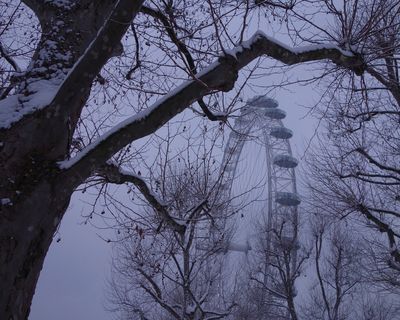Alex Ross's Blog, page 177
January 26, 2013
Question of the day
January 25, 2013
January 24, 2013
From arts to leisure
 Jim Oestreich, a longtime critic and editor at the New York Times, former mainstay of Wisconsin high-school football, announced yesterday that he would leave the paper at the end of the month. "I am excited about the prospect (finally) of balancing my life with a bit of teaching, other writing and maybe even a book project," he wrote, in an e-mail to colleagues. I'd like to pay personal tribute to a boss-turned-friend who supported and shaped my work when I first stumbled into criticism. Having a slow writerly metabolism, I was generally unhappy with the quick pace of the Times, but Jim gave me time to ponder Nordic symphonies, composer graves, and other odd obsessions. A Sunday piece that I wrote in the summer of 1995 became the germ of my book The Rest Is Noise; his avid interest made me think that I was onto something. More importantly, Jim unleashed on an unsuspecting world the essayistic brilliance of Richard Taruskin, first in Opus magazine and then at the Times. He has cultivated many other writers from the musicological field, showing that scholarship and journalism need not be as far apart as they sometime seem. He has intensified the paper's coverage of early music and tirelessly fought the neverending battle for space. Although I'm confident that the Times can find an editor-critic to carry on what Jim has achieved, he will in many ways prove irreplaceable. My gratitude is very deep.
Jim Oestreich, a longtime critic and editor at the New York Times, former mainstay of Wisconsin high-school football, announced yesterday that he would leave the paper at the end of the month. "I am excited about the prospect (finally) of balancing my life with a bit of teaching, other writing and maybe even a book project," he wrote, in an e-mail to colleagues. I'd like to pay personal tribute to a boss-turned-friend who supported and shaped my work when I first stumbled into criticism. Having a slow writerly metabolism, I was generally unhappy with the quick pace of the Times, but Jim gave me time to ponder Nordic symphonies, composer graves, and other odd obsessions. A Sunday piece that I wrote in the summer of 1995 became the germ of my book The Rest Is Noise; his avid interest made me think that I was onto something. More importantly, Jim unleashed on an unsuspecting world the essayistic brilliance of Richard Taruskin, first in Opus magazine and then at the Times. He has cultivated many other writers from the musicological field, showing that scholarship and journalism need not be as far apart as they sometime seem. He has intensified the paper's coverage of early music and tirelessly fought the neverending battle for space. Although I'm confident that the Times can find an editor-critic to carry on what Jim has achieved, he will in many ways prove irreplaceable. My gratitude is very deep.
At the grave of Luranah Aldridge
The forgotten Afro-Swedish contralto, whom Gounod hailed as one of the most beautiful voices he had ever heard, lies in this area of Gunnersbury Cemetery, in London. Her headstone is no longer extant; I decided to consider the tree her monument. I will speak about her at the WagnerWorldWide Conference, in Columbia, South Carolina, on Jan. 31.
January 22, 2013
Spring for Music 2014
Festival Chorus in John Adams's Harmonium and R. Nathaniel Dett's 1931 oratorio The Ordering of Moses, which, as I recall, has some stunning passages. (I reviewed a 1993 performance for the Times.) And on May 10 it's Manfred Honeck and the Pittsburgh Symphony in the final scene of Poulenc's Dialogues of the Carmelites, James MacMillan's Woman of the Apocalypse, and a new version of the Mozart Requiem. This series will be missed and mourned.
January 21, 2013
Lutosławski in brief
After Chopin. The New Yorker, Jan. 28, 2012.
Generation Kill (2)
Here is a new video of Generation Kill, Stefan Prins's ferocious study in joystick technology and drone warfare, which the Nadar Ensemble first performed at Donaueschingen last fall. My report on the festival is here.
January 20, 2013
London snow
January 3, 2013
Hiatus
January 2, 2013
Black Wagner and the Rest Is Noise
I have several appearances coming up this month. On January 19th, The Rest Is Noise, a year-long festival inspired by the book of the same title, opens at Southbank Centre in London. I'll give four allied lectures over the course of the year; the first of these, "The Big Bang," is at noon on the 19th, in Queen Elizabeth Hall. It will survey the emergence of radical new musical languages in the late nineteenth and early twentieth centuries. Expect plentiful audio snippets of Wagner, Liszt, Debussy, Strauss, Schoenberg and pupils, Stravinsky, Bartók, Janáček, Grainger, Satie, Ravel, Les Six, Varèse, Gershwin, Ruth Crawford Seeger, Sibelius, and the Valley Tonga people. There may also be an attempt at the piano. The following day, at 11:30AM, I'll converse with Jude Kelly, artistic director of Southbank, who had the mad idea for this enterprise. Tickets are available as part of Southbank's Saturday, Sunday, and Weekend Passes; details here. Happily, I'll also be able to hear The Minotaur at the Royal Opera. The next lecture, on collisions of music and politics, is on March 2. As I noted when the festival was first announced, I was not involved in the programming.
Meanwhile, I have been working on a new book, entitled Wagnerism: Art in the Shadow of Music. I can't say that I'm anywhere close to finishing, or even that I've created a big pile of paper, but I've unquestionably read a lot of books and taken a great many notes. On Jan. 31, I'll appear amid an intimidating lineup of scholars at the WagnerWorldWide Conference at the University of South Carolina, addressing the topic "Black Wagner: The Question of Race Revisited." The talk will focus especially on W.E.B. Du Bois, whose story "Of the Coming of John" is one of the most highly charged instances of literary Wagnerism, and on the almost completely unknown contralto Luranah Aldridge. Time will not allow for an examination of the Afro-Wagnerian dimensions of Quentin Tarantino's Django Unchained — a topic for another time, perhaps.
Alex Ross's Blog
- Alex Ross's profile
- 425 followers








